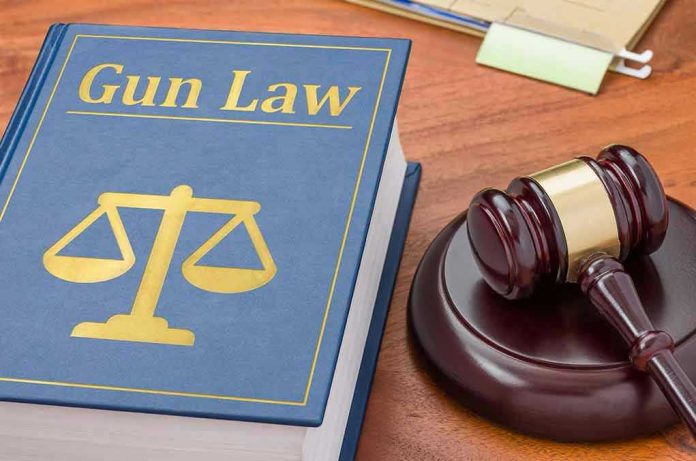
What if the Supreme Court’s next gun rights decision hinges on whether a single puff of pot can strip you of your Second Amendment freedoms—forever?
Quick Take
- The Supreme Court will hear a pivotal case on whether federal law can categorically bar drug users, including marijuana users, from owning firearms.
- Lower courts have split: some say only current impairment should matter, others back an outright ban.
- This is the first direct constitutional challenge to a 1968 gun control statute targeting drug users.
- The outcome could redefine the relationship between drug use and gun rights, with lasting consequences for public policy and individual freedom.
Supreme Court Steps Into a Legal Crossfire
Arguments over who can own a gun have always defined the American legal landscape, but in October 2025, the debate reached an explosive new front. The Supreme Court agreed to hear the case of Ali Danial Hemani, a man charged with violating a federal statute because of his marijuana use. His case forces the justices to confront a single, unyielding question: does the Constitution allow the government to bar all drug users from possessing firearms, even if they’re not high at the time?
The law at the center of this showdown, part of the 1968 Gun Control Act, has long prevented anyone who is an “unlawful user” of controlled substances from owning a gun. For decades, this provision hovered quietly in the background—until lower courts began splitting hairs over its constitutionality. The Fifth and Eighth Circuits have now ruled that a blanket ban violates the Second Amendment unless the user is actually under the influence when in possession. The Department of Justice, worried about public safety and potential violence involving armed, impaired citizens, insists the restriction is vital. The Supreme Court is now set to decide whose logic holds the most constitutional weight.
The Law’s Origins and the Shifting Battlefield
Federal restrictions on guns for drug users trace back to the turbulent 1960s, when Congress first passed the Gun Control Act. Lawmakers intended to disarm individuals considered “dangerous”—felons, the mentally ill, and yes, drug users. In the decades since, as attitudes toward marijuana softened and state laws diverged, the federal ban stood largely unchallenged. Everything changed after the Supreme Court’s 2022 ruling that demanded gun laws align with “historical tradition.” Suddenly, courts began to question whether there’s any precedent for such a sweeping prohibition.
SCOTUS agreed to consider if it’s constitutional to prohibit users of illegal drugs from owning guns.
The case stems from Ali Danial Heman’s successful challenge to his, which he violated by owning a pistol and habitually using marijuana.https://t.co/UTMXZpN17P
— The Daily Signal (@DailySignal) October 20, 2025
Ali Danial Hemani’s case is not isolated. High-profile incidents, like Hunter Biden’s conviction under the same law, put a spotlight on how the ban is enforced, who gets prosecuted, and whether the statute is even workable in a country where marijuana is legal in nearly half the states. The Justice Department’s aggressive defense of the law stands in stark contrast to the growing number of Americans—and judges—who view it as an overreach. The Supreme Court’s answer could either entrench the status quo or force a dramatic rethinking of federal and state gun policies.
Stakeholders and the Stakes Behind the Scenes
The case pits three powerful interests against each other. Hemani, the defendant, wants the charges dropped, arguing that his past marijuana use has nothing to do with his constitutional right to own a firearm. The Department of Justice, armed with decades of federal precedent, maintains that drug users—current or habitual—pose a unique risk to public safety and must be disarmed. The Supreme Court justices, for their part, face the task of reconciling modern realities with centuries-old constitutional text.
The outcome will ripple through law enforcement agencies, gun owners, and anyone who has ever used marijuana, even in states where it’s legal. Legal experts see the case as a bellwether for how the Court will balance historical context, evolving social norms, and public safety. Gun rights advocates argue the law is too broad, while public safety proponents insist it’s necessary to prevent dangerous, intoxicated individuals from wielding deadly weapons.
Broader Implications and the Future of Gun Law
The Supreme Court’s ruling will not merely settle Hemani’s fate—it will clarify or upend decades of federal firearm policy. In the short term, prosecutors across the country are watching closely, as ongoing cases may be dismissed or revived depending on the Court’s interpretation. States with their own restrictions on gun ownership for drug users could be forced to revisit their statutes, while the firearms industry braces for new compliance headaches or expanded markets.
Long-term, the decision could redraw the boundaries of the Second Amendment for a new generation. If the Court finds the federal ban unconstitutional except when someone is actually under the influence, thousands of Americans—past, present, or casual marijuana users—could regain gun rights previously denied. On the other hand, if the justices uphold the ban, the government’s power to restrict gun ownership based on lifestyle choices will be cemented. Either way, the ruling will shape debates over drugs, guns, and personal liberty for years to come.




